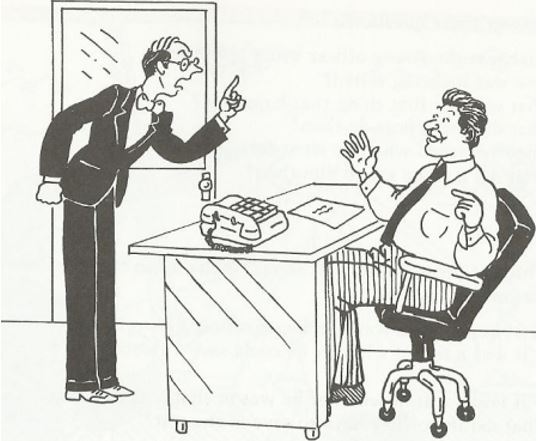
Smarts get promoted
 المؤلف:
L.A Hill
المؤلف:
L.A Hill
 المصدر:
Advanced-Anecdotes in American English
المصدر:
Advanced-Anecdotes in American English
 الجزء والصفحة:
24-1
الجزء والصفحة:
24-1
 15/10/2022
15/10/2022
 1993
1993

When George Jones finished college, he became a clerk in a big company, hoping to advance to higher positions as time went on. He did his work reasonably well, but he wasn't very smart, so when the older employees retired from higher positions, it was never Jones who was promoted.
After he had been with the company for fifteen years without ever being promoted, a smart young man, straight from college, came to work in the same department, and after a year, he was promoted above Jones.
Jones was angry that he hadn't been promoted instead of this young man, so he went to his manager and said, "I've had sixteen years' experience on this job, yet a new man has been promoted over my head after having been here only one year."
"I'm sorry, Jones," answered the manager patiently, "but you haven't had sixteen years' experience: you've had one year's experience sixteen times."
A Answer these questions:
- What job did George Jones get after leaving college?
- What was his ambition?
- Why didn't he get promoted?
- Who joined the same department fifteen years after him?
- What happened after a year?
- Why did Jones go to see the manager?
- What did Jones say to him?
- What did the manager answer?
B Write these sentences, choosing the correct word under each blank space.
1. The man (promoted) (promoting) _________ above Jones's head was very (interested) (interesting) _________in getting ahead in life.
2. The other people (worked) (working) _________ in Jones's department found him (interested) (interesting) _______to talk to.
3. Students (finished) (finishing) ________ college in the summer were usually (chosen) (choosing) __________ by the company in the autumn.
4. Clerks (chosen) (choosing) ________ to be (promoted) (promoting) _________ were usually young rather than old.
5. The manager (talked) (talking) ________ to Jones did not think Jones was very (experienced) (experiencing) ________.
C Draw lies from the words on the left to the correct words on the right. Then write out the five complete sentences.
1. Jones a. did not think Jones had a lot of experience.
2. Jones's experience b. retired from the company.
3. Older employees c. was angry because he was not promoted.
4. The manager d. was promoted after a year.
5. The new young man e. was the same each year.
 الاكثر قراءة في Advanced
الاكثر قراءة في Advanced
 اخر الاخبار
اخر الاخبار
اخبار العتبة العباسية المقدسة


